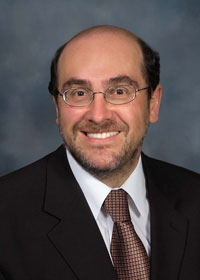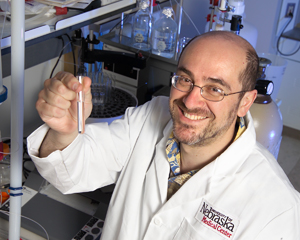 |
For his work in nanomedicine, Alexander “Sasha” Kabanov, Ph.D., received the University of Nebraska’s Outstanding Research and Creative Activity Award. |
Take a closer look at those letters and the other nomination materials for Dr. Kabanov, and it’s easy to understand why the expert in nanomedicine and drug delivery is the recipient of this year’s Outstanding Research and Creative Activity Award (ORCA), given annually by the University of Nebraska.
Dr. Kabanov is a professor in the College of Pharmacy Department of Pharmaceutical Sciences and is the Parke-Davis Chair in Pharmaceutics. He also directs the regents-approved Center for Drug Delivery and Nanomedicine (CDDN) at UNMC.
“I am happy to be recognized with the award, but it’s really about the team that’s in place here at UNMC and the colleagues that I collaborate with at other institutions,” Dr. Kabanov said. “I also have to especially recognize College of Pharmacy Dean Clarence Ueda (Pharm.D., Ph.D.), who provided leadership for the growth of research in the College of Pharmacy, as well as the vision and support in the establishment of the CDDN.
“Clarence extended advice, mentorship and enhanced the overall research environment at the College of Pharmacy.”
Dr. Ueda seconded the nomination of Dr. Kabanov for the ORCA. Howard Gendelman, M.D, chairman of the Department of Pharmacology and Experimental Neuroscience and director of the Center for Neurovirology and Neurodegenerative Diseases (CNND) at UNMC, nominated Dr. Kabanov for the award.
Dr. Ueda said that Dr. Kabanov has been “truly an outstanding faculty member in every sense of the term.
|
|
“His excellence in research is second to none on the UNMC campus, and I would dare say within the entire university,” Dr. Ueda said. “He has demonstrated extraordinary innovation, creativity and productivity.”
Dr. Gendelman had similar thoughts about Dr. Kabanov.
“I have not met another scientist who has the rare ability to bring together vision, intelligence, resourcefulness, determination, hard work, teaching and dogged determination in an affable uncompromising manner with the solitary goal of scientific excellence as I have seen Sasha do,” Dr. Gendelman said.
Dr. Kabanov has been recognized at several levels internationally for his development of novel ways to get drugs to various areas of the body via polymers and other transporting mechanisms, to treat cancer and neurodegenerative diseases. Dr. Kabanov also has been a pioneer in using polymer-based nanotechnologies to carry drugs and DNA to targeted sites.
Currently, Dr. Kabanov is working on several fronts. One includes field of “polymer genomics” that he pioneered that studies how delivery systems are inducing cell responses to the drugs being delivered, and whether that biological response actually creates a different drug or makes the drug behave drastically different.
He initiated collaboration with material scientists at Virginia Tech to study whether there are ways to make drugs behave differently through materials that can respond to magnets or ultrasound machines placed on the outside of the body near the targeted sites. He also leads an interdisciplinary team at CDDN including polymer scientists, immunologists, cancer biologists and radiologists that develop nanomaterials for non-invasive imaging for early diagnosis of cancer and other diseases.
Dr. Kabanov said that his efforts in research and education has two dimensions: the global aspect of trying to advance science and create new technologies that will advance pharmaceutical industry and improve treatment of patients; and the more local aspect of building a world-class scientific team and mentoring junior scientists as they embark on their research careers at UNMC.
“I want to mentor graduate students of increasingly good quality, and also post-docs and young faculty,” Dr. Kabanov said. “In the end, I love my students and I want them to be successful, but I want them to work extremely hard for their successes to ensure that reach the greatest possible goals. My goal is to develop creativity and innovation in others — students, post-docs and junior faculty alike. We really have just scratched the surface in this respect, and we want to continue to recruit to UNMC the top people at all levels.”
 Those people, Dr. Kabanov said, must be willing to cross traditional disciplinary lines to make an impact in science. He credits much of his success with being able to work with scientists throughout the Colleges of Pharmacy and Medicine, as well as the Eppley Cancer Center.
Those people, Dr. Kabanov said, must be willing to cross traditional disciplinary lines to make an impact in science. He credits much of his success with being able to work with scientists throughout the Colleges of Pharmacy and Medicine, as well as the Eppley Cancer Center.
“Collaboration creates better sciences, which leads to better papers and more grant funding,” Dr. Kabanov said. “As the CDDN grows, we’ll have many departments represented so that we can have the best science and the most chance for success.”
When not at work or visiting his mother in Russia, Dr. Kabanov likes to spend time with his wife, Tanya, and his three daughters, Masha, 22; Dasha, 13; and Natasha, 5.